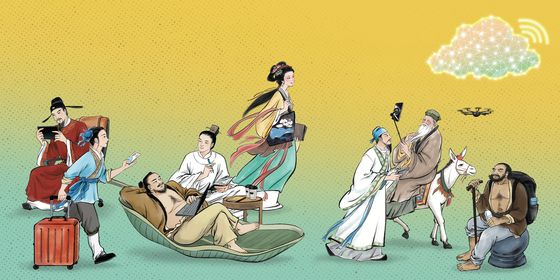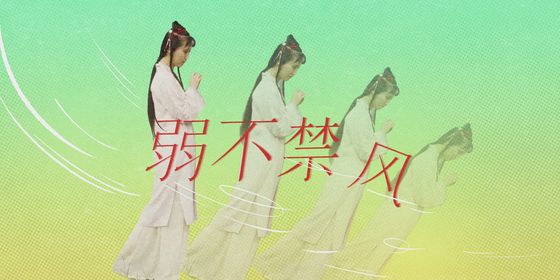Idioms relating to the ancient symbol of longevity
In Chinese culture, there are four sacred animals known as “四灵 (sì líng),” which are revered as symbols of good fortune and believed to ward off evil spirits. But while the dragon, phoenix, and qilin are imaginary creatures, the fourth sacred animal, the turtle, exists in our world.
Sacredness, though, is no guarantee of positive connotations: In some dialects, turtle-related phrases contain derogatory meanings, such as the phrase “son of a turtle”—a curse in Sichuanese. Generally, though, turtles represent good luck and are invoked in blessings, mainly because they can survive all kinds of harsh environments and enjoy a long life.
Throughout history, this animal has inspired many chengyu:
龟龄鹤算 Age like turtles and cranes
In Chinese mythology, turtles and cranes are both benevolent animals, and both are believed to be able to live more than 1,000 years. Thus, they are regarded as symbols of longevity. Sometimes also written as “龟年鹤寿,” this phrase is often used as a birthday greeting for elderly people.
I wish you good health and a long life.
Zhù nínlǎo shēntǐ jiànkāng, guīlíng-hèsuàn.
祝您老身体健康,龟龄鹤算。
龟玉毁椟 Turtle shell and jade destroyed in the box
According to The Analects of Confucius, the sage once criticized incompetent government officials by asking: “Beasts like tigers and rhinoceros come out of cages, yet turtles [whose shells were traditionally used for divination] and jade [used for offering sacrifice to ancestors and gods] are destroyed in the box. Whose fault is it?” This question was summarized into an idiom (pronounced “guī yù huǐ dú”) that describes the harm done to a country by unfit officials.
蝉腹龟肠 Belly of cicada and intestines of turtle
Ancient people believed that cicadas live by drinking dew only, and turtles likewise can subsist on just water. Humans, though, can never live without food. If someone says their stomach feels as empty as that of a cicada or turtle, it means they are starving.
I’ve had the stomach of cicada and a turtle for a long time. How can I feed myself in such circumstances?
Wǒ shì chánfù-guīcháng, wéirì yǐ jiǔ. Rúcǐ shìdào, wǒ yòu néng rúhé bǎofù?
我是蝉腹龟肠,为日已久。如此世道,我又能如何饱腹?
悬龟系鱼 Hang turtles and fasten fish
In the Tang and Song dynasties, government officials wore small pouches on their waist embroidered with patterns of fish or turtles—known as “fish bags 鱼袋 ” or “turtle bags 龟袋,” sometimes with a fish-shaped amulet inside—to demonstrate their status. So if you describe a person as “wearing fish and turtles,” it meant that they were a high-ranking official. The slang term “金龟婿,” literally “gold-turtle son-in-law,” also originated from this baldric-wearing tradition, and today refers to an ideal son-in-law of high social standing and great wealth.
Those officials wearing turtle and fish baldric didn’t actually do good for the ordinary people.
Nà xiē xuán guī-jìyú de guānyuán men bìng méiyǒu wèi lǎobǎixìng zuò shénme shíshì.
那些悬龟系鱼的官员们并没有为老百姓做什么实事。
金龟换酒 Exchange gold turtle for alcohol
The “turtle bag” very precisely denoted the rank of most imperial officials, but not all. He Zhizhang, a great poet, calligrapher, and official of the Tang dynasty, once traded his gold-turtle bag for money in order to buy booze and drink together with Li Bai, another famous Tang poet and alcoholic, whom He encountered in a tavern. The two poets had a raucous time, and left this chengyu as proof of He’s generosity.
Ancient people would trade their gold-turtle bags for wine; so how could you refuse to buy your friend a drink?
Gǔrén kěyǐ jīnguī huàn jiǔ, nǐ zěnme néng jùjué qǐng péngyǒu hējiǔ ne?
古人可以金龟换酒,你怎么能拒绝请朋友喝酒呢?
Cover Image from VCG












